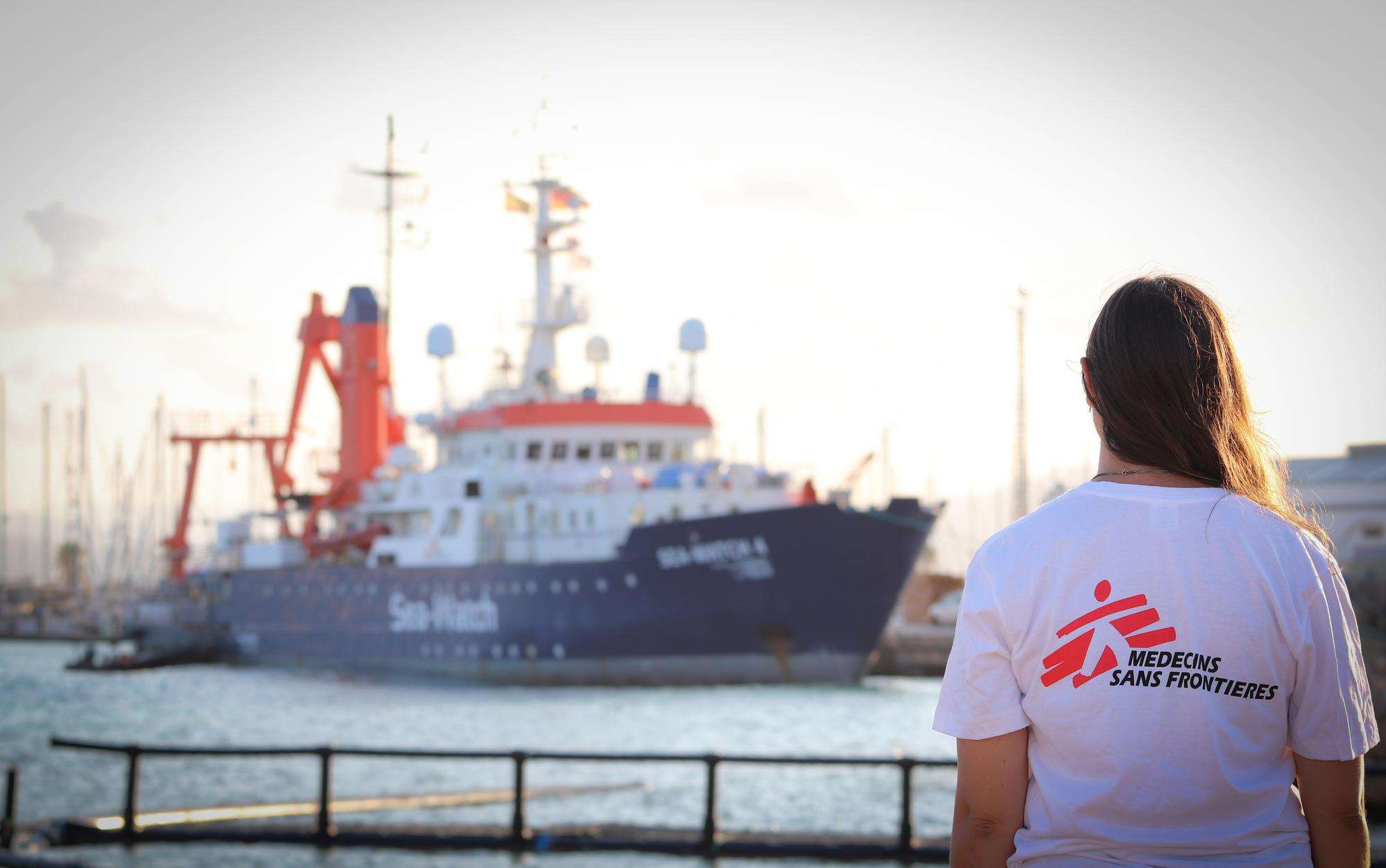Berlin/ Burriana/New York, August 6, 2020—Doctors Without Borders/Médecins Sans Frontières (MSF) will relaunch its lifesaving search and rescue operations in partnership with Sea-Watch, a nongovernmental organization (NGO) that conducts search and rescue operations in the Central Mediterranean Sea, the international medical humanitarian organization announced today. The organizations plan to return to sea by mid-August on board a new ship, the Sea Watch 4, as European member states continue to use the COVID-19 pandemic as an excuse to block search and rescue activities, perpetuate cycles of abuse in Libya, and condemn people to drown at sea.
“Recent state measures to discourage or block life-saving activities in the Mediterranean cloaked in public health rhetoric are reckless and politically motivated,” said Oliver Behn, MSF director of operations. “As a medical humanitarian organization, MSF acknowledges the challenges presented by COVID-19. [However] no human being should be left to drown. No human being should be forced to endure torture and suffering. Yet, these are the consequences of [harsh policies] by European governments.”
MSF will send a four-person medical team—including a midwife and a doctor—and two communications and advocacy personnel to join a 21 person crew on board the Sea Watch 4. Sea-Watch will run the ship and rescue operations and MSF will be responsible for delivering emergency medical care.
Since 2015, MSF has partnered with various search and rescue organizations to assist more than 80,000 vulnerable people along the deadly stretch of water between Libya and Italy. Its most recent partnership was with SOS MEDITERRANEE on board the Ocean Viking, but the organizations were forced to end operations in April 2020 as European governments ramped up efforts to paralyze search and rescue activities.
Over the past five months, Italy and Malta have denied assistance to those stranded at sea in flimsy unseaworthy boats and have closed their ports to NGO ships carrying rescued people. Their deliberate lack of coordination is leaving people in distress at sea for hours, days, or even weeks without assistance.
At least 101 people were reported dead or missing in June alone, and last week three people were killed while being forcibly returned to Libya—from where they were attempting to flee.
Libya is defined as categorically unsafe for migrants, refugees, and asylum seekers by international and European institutions, including the United Nations, the International Organization for Migration, and the European Commission. Yet, since the beginning of the year, 5,650 people have been intercepted at sea and forcibly returned to Libya as part of a bilateral deal financed and facilitated by the European Union (EU).
Many of the hundreds of people returned to captivity in Libya remain missing, others are held in overcrowded unsanitary conditions in detention centers and lack access to food and water. It is impossible for people in these centers to maintain physical distancing or practice hygiene measures that help to prevent the spread of COVID-19, like handwashing.
The COVID-19 pandemic has put further pressure on the Libyan health care system, already near collapse after years of conflict that escalated earlier this year. The situation in Libya is a humanitarian emergency.
Without access to safe and legal alternatives, thousands of people attempt the deadly crossing to Europe as a last resort. Lack of search and rescue capacity does not deter people—it only makes the risks they are forced to endure even more extreme. The number of people who tried to cross the Mediterranean increased four-fold in comparison to the same period last year.
As NGO search and rescue vessels—including the Sea-Watch 3 and the Ocean Viking—continued to be systematically blocked in Italian ports on the basis of unsubstantiated technicalities, search and rescue operations gained social support. The Seawatch 4 was purchased with help from civil society organization, United4Rescue—a coalition of more than 500 members.
"The Sea-Watch 4 and the broad alliance standing behind it is the civil society’s response to the EU’s racist policy of letting people drown rather than reaching European shores,” says Philipp Hahn, Sea-Watch 4’s head of mission. “It is a symbol of solidarity with people on the move and a clear signal to the EU that, despite all their efforts to hinder us, we will not stop rescuing. People are being left to die on the water or are pushed back to the very place from which they are trying to escape, while EU border patrol aircraft watch from above, complicit in sealing their fate. As long as the EU states are letting people drown as a deterrent we will carry on, and we will have support.”




